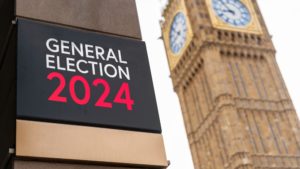Market Update 8th July 2024

An electoral open goal
The 2024 General Election saw markets react with classic British understatement. Arguably, that’s because the large majority Labour won was approximately what was expected. But there hasn’t been a tidal wave of support behind the party. Its share of the vote has hardly changed since 2019.
This is largely because back then, the election was billed as far more binary. You were either for Boris, or for Corbyn. So much so that the Brexit Party (one of three separate parties Nigel Farage has fronted ahead of the last three elections) declined to stand against Conservative candidates. This year, Reform UK went after the Tory vote like a hungry bulldog eating a frankfurter.
That helped split the right of centre vote, allowing Labour and Liberal Democrats to pick up an extra 270 seats while only gaining a combined 2% or so more of the popular vote. Remarkably, these two parties are 210 seats better off than they were after the 2017 vote, despite their combined share of the vote falling around 1.4 percentage points since that poll.
So, what happens next? Labour govern, that’s a given. Under Starmer and Reeves, capital gains tax and inheritance tax could both be reviewed. Any changes here would, of course, potentially impact investors. But for the most part, policy proposals are actually akin to what you might expect to hear from a Conservative chancellor. Increases to income tax, VAT and national insurance have been ruled out, while Labour is openly planning to ‘reinvigorate’ capital markets. That’s a particularly welcome policy, and a far cry from Corbynism.
Elsewhere, the fallout for the Conservatives (and there will be plenty of fallouts as the inquest rips through the party) will be significant. The Green vote was hugely inflated too, hopefully serving as a timely reminder that the environment needs urgent attention. With a drop in vote and seats, the Scottish independence question goes away. For now.
Across the pond, there are still four months before the US election. A look at the 2020 results tells us only a small number of states actually matter. If California goes Red, or Louisiana turns Blue, I’ll eat my cowboy hat. Whoever wins the majority of states like Wisconsin, Pennsylvania, Michigan, Nevada and Georgia will likely get the keys to the White House. The combined population of these states is in the region of 43m. In 2020, about half the total population voted. If we say about 20% of the votes in those states are up for grabs, that leaves the power with about 4.3m voters, or little over 1% of the country’s total population.
Here’s a nowhere-near exhaustive list of questions that we’d need to correctly answer to have a chance of being right about what these people will do. Will Biden step aside before polling day? Who would replace him? What skeletons remain in Trump’s closet? How will Republican fiscal policy change pre-election? What will the weather be like on the day?
At this stage, the answer to all of the above is ’we don’t know’. Even if we could guess the result, knowing its impact is another thing entirely. For example, you’d have thought US carbon emissions would have risen under Trump’s last tenure. Nope. And not just because of Covid. They were tracking lower by 2019 and dropped further in 2020.
This shows us that the relative significance of the US private sector should not be underestimated. It has a track record of fantastic innovations that have created extraordinary amounts of wealth over a string of different regimes. That said, political change, and fiscal responsibility in particular, matters. Just ask Liz Truss. We’ll be keeping an eye on developments.
It would be wrong to go to press without a quick word about the football. This is meant to be a mildly interesting investment blog, so I’ll keep my assessment of whether England are creative enough or positive enough to myself. But in the spirit of being mildly interesting, I can confirm that according to YouGov – who as above predicted the election pretty well this year – the last time England played a euros fixture on a weekday during normal working hours, employees downing tools to watch the game was estimated to have cost the UK economy more than £250m in lost productivity. Kick off times of 5pm and 8pm for England and Scotland mean such a hit was likely avoided this time.
In fact, the football has probably brought a boost to the nighttime economy and retail sectors. Estimates vary, but the effect of fans coming home with beers and pizzas to watch the game on a new TV, plus the spending of those watching in the pub, is likely to stretch into the billions. Regardless of whether England’s gonna throw it away, it’s nice to think we’re doing our bit for GDP isn’t it…

George Salmon – Senior Research Analyst
Hawksmoor Investment Management Limited is authorised and regulated by the Financial Conduct Authority (www.fca.org.uk) with its registered office at 2nd Floor Stratus House, Emperor Way, Exeter Business Park, Exeter, Devon EX1 3QS. This document does not constitute an offer or invitation to any person in respect of the securities or funds described, nor should its content be interpreted as investment or tax advice for which you should consult your independent financial adviser and or accountant. The information and opinions it contains have been compiled or arrived at from sources believed to be reliable at the time and are given in good faith, but no representation is made as to their accuracy, completeness or correctness. The editorial content is the personal opinion of George Salmon. Other opinions expressed in this document, whether in general or both on the performance of individual securities and in a wider economic context, represent the views of Hawksmoor at the time of preparation and may be subject to change. Past performance is not a guide to future performance. The value of an investment and any income from it can fall as well as rise as a result of market and currency fluctuations. You may not get back the amount you originally invested. Currency exchange rates may affect the value of investments.
View more news